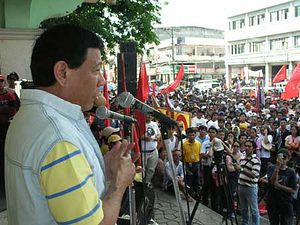It has become commonplace to refer to Rodrigo Duterte as the Philippines’ first leftist president. Duterte himself has publicly made the claim, much to the alarm of some outside observers as well as some in the Philippines.
In reality, the claim is disputable, and it is not really certain whether he is serious about advancing socialist causes.
It is certainly true that Duterte has solid leftist links dating back decades, and that he was often considered an ally by Davao’s revolutionary forces when he was mayor for two decades.
Leftist or not, Duterte’s actions do suggest where his leanings may lie. Duterte has appointed three Cabinet members nominated by the Communist Party. He delegated the government’s land reform program to a radical peasant leader. He quickly resumed peace talks with communists by releasing top rebel leaders. He even endeared himself to nationalists by declaring his “separation” from the “imperialist” United States and was the first president to identify the colonial crimes of the U.S.
But a year later, Duterte appears to be distancing himself from his leftist allies. He declared an all-out war policy against the communist-led New People’s Army. He suspended the peace talks and insisted that a ceasefire agreement is a precondition before the government would agree to the release of more political prisoners or the signing of a social and economic reform pact with the communists. He warned that after defeating ISIS-backed terrorists in Marawi, his next target is the wiping out of the communist threat in Mindanao. He instructed the military to “flatten the hills” and bomb communities where communist rebels are operating. And most recently, he ordered the police to join the army in the counterinsurgency drive.
The Left has not held back in its own response, repeatedly exposing Duterte’s numerous failures as a leader. The Communist Party denounced the human rights record of the government; in particular, the bloody impact of the ill-conceived “war on drugs” and the continuing militarization of communities in Mindanao. It accused Duterte of serving the interest of big landlords, foreign plunderers, and even the government of U.S. President Donald Trump. It warned against the unfolding dictatorship in the country after Duterte extended Martial Law in Mindanao aside from appointing at least 13 generals in his Cabinet.
As of this writing, Duterte continues to engage in a word war with top communist leaders. He said the government is ready to wage war for another 50 years in order to defeat the rebels.
Does this represent the long-term approach of the Duterte government in dealing with the Left?
The bickering on both sides may continue and could even worsen in the coming days and weeks. But it is important to highlight that even as Duterte has lambasted communists in his speeches, he has not yet removed the three communist-appointed members in his Cabinet. A palace official told the media that the three leftist Cabinet members continue to enjoy the trust of the president.
Furthermore, despite Duterte’s frequent outbursts against the NPA rebels, he has not formally terminated the peace process. The fifth round of talks is suspended, but the overall mechanism for continuing the peace process remains valid.
After delivering his second state of the nation address, Duterte went outside the Congress complex to speak before a large crowd of leftist protesters. He repeated his tirades against rebels but he also hinted that he remains an ally and a friend of the left. He appealed for more time to deliver reforms. He said he will support the resumption of the peace talks but only if the rebels will stop conducting ambush operations.
As a veteran politician, Duterte is aware that the Left is a force that can strengthen the ranks of the political opposition. Duterte has just survived an impeachment attempt, this is no time for him to make more enemies in the political battlefield.
Perhaps there is continuing opportunity to move forward in the peace process, which explains why Duterte continues to include the Left in his Cabinet. And perhaps this is the same reason why the Left has not called for the ouster or removal of Duterte from power.
But the situation today is precarious, and things can escalate quickly. A daring NPA attack can provoke Duterte or the formal ending of the peace process can lead the left to call for the ouster of the president. And there’s always the possibility that a total war between the left and Duterte can arise in the coming weeks.
What is clear is that Duterte, at least for now, has stopped referring to himself as a leftist and socialist as he did before.

































